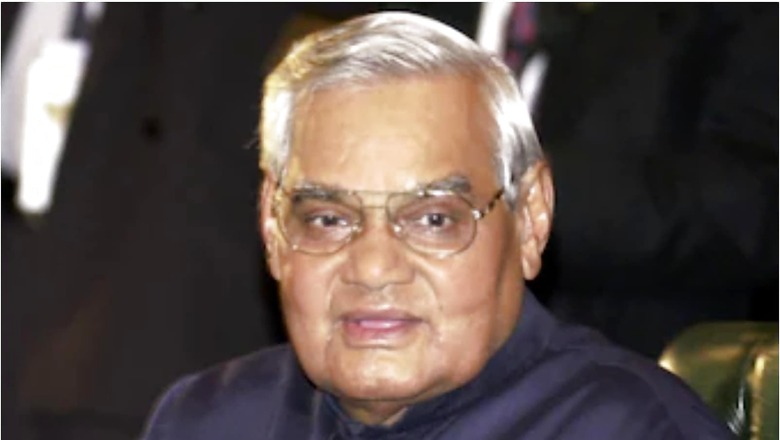
views
The business of scoring self-goals—palpably—appears to be the Indian National Congress’ favourite pastime hobby under Rahul Gandhi’s stewardship. No matter how unwarranted, unwanted, or uncalled for, the Congress somehow manages to lure the flak and sear heat upon itself, and the worse comes when it takes a step ahead in defending the indefensible rather than a tactical retreat.
This time, a day after the Congress party announced Rahul Gandhi’s visit to the memorial of former Prime Minister, Bharat Ratna Atal Bihari Vajpayee, Congress leader Gaurav Pandhi referred to the Bharatiya Janata Party (BJP) stalwart, whose 98th birth anniversary was celebrated on Sunday, as a “British informer” during India’s freedom struggle. Pandhi works as a coordinator for the All India Congress Committee (AICC) in the office of Congress President Mallikarjun Kharge. The attack took place barely one day before Rahul Gandhi visited Vajpayee’s monument. “In 1942, like all other members of the RSS, Atal Bihari Vajpayee boycotted the Quit India Movement and worked as a British Informer reporting against those who participated in the Andolan. Be it the Nellie massacre or the demolition of Babri, Vajpayee played an important role in inciting mobs. There is a reason why BJP leaders today always liken Modi to Gandhi, Patel, or other Congress leaders and not Savarkar, Vajpayee, or Golwalkar. They know the truth! (sic),” Pandhi wrote on Twitter.
Frankly, it seems a bit rich, if not churlish, coming from a self-professed “Gandhian” of the grand old party. If facts were to be exhumed, the congressman’s argument would undoubtedly fall flat again—and be far from reality!
“On August 27, 1942, a ballad was being recited by Liladhar Bajpai alias Kakua and Shiv Kumar alias Mahuan in the market at Bateshwar (Agra district). A large crowd had gathered, and among them were the Vajpayee brothers, Atal and Prem,” notes author Kingshuk Nag in his telling book Atal Bihari Vajpayee: A Man for All Seasons.
He adds, “Soon, the police arrived and made extensive and indiscriminate arrests. Both Atal and Prem were arrested and sent off to Agra jail, where they stayed for 23 days. Statements were recorded before the magistrate. S. Hassan, a Class II magistrate, recorded the statements of the two Vajpayee brothers under Section 164 of the Code of Criminal Procedure (CrPC). The statements were recorded in Urdu, a language not known to Atal and Prem. Incidentally, statements made under this section could be used against those making them. Both brothers gave identical statements about the sequence of events and said that though they were part of the protesting crowds, they had not participated in the arson. The Vajpayee brothers were not prosecuted and their statements were not used in court. Many others who had been arrested and interrogated were also released.”
The point to be emphasised here is that Atal Bihari Vajpayee was barely an adult (aged 18) in 1942. Later, in an interview with Frontline magazine in 1998, Liladhar Vajpayee admitted that the prosecution had not used the Vajpayee brothers’ statements as evidence to convict him.
That Jawaharlal Nehru thought highly of Vajpayee is well documented in the public domain. “Nehru began taking an avuncular interest in this talented young man,” writes Mani Shankar Aiyar in an article. He would make it a point to introduce him to foreign guests and invite him to receptions thrown in honour of the visiting dignitaries. Nehru once introduced Vajpayee to the British prime minister, stating, “He is a young leader of the Opposition who is always criticising me, but I see a great future in him.” At another reception for a foreign dignitary, Nehru introduced Vajpayee as “India’s blooming young parliamentarian.”
It is said that at another reception, Nehru introduced him as someone who could be the future prime minister. “The prime minister had remarked to his colleagues that he saw in Vajpayee, signs of a man, who might step into the prime minister’s shoes one day,” writes journalist Nilanjan Mukhopadhyay in his book The RSS: Icons of the Indian Right. In 1958, Nehru included Vajpayee, a first-time Member of Parliament, in an official delegation to the UN General Assembly and personally instructed Maharaja Krishna Rasgotra, who was an officer in India’s Permanent Mission to the UN, to not only chaperone Vajpayee but also ensure that he was introduced to world leaders. M.K. Rasgotra himself recounts this in his autobiography, A Life in Diplomacy.
Politicians enjoy stoking controversy and thereby, smearing muck in the process. But the Congress party leaders have not only mastered but have also owned this form of art. What raises heckles is the deliberate or inadvertent maligning, disparaging, and vilification of icons of national reverence. Whether it is Veer Savarkar, M.S. Golwalkar, Atal Bihari Vajpayee, or Prime Minister Narendra Modi — they are larger-than-life personas and enjoy a herculean stature, so to speak. Attempting to besmirch an established brand when you claim to have issues and ideological differences with the BJP only ratifies the bankruptcy of issues.
There are a few pertinent questions that Rahul Gandhi, as the de facto Congress chief, needs to answer:
- The culpable individual merely deletes the tweet after the controversy snowballed but still sports the AICC post with no official response regretting or condemning the act from the Congress party. Is this condoning the act?
- Should Rahul Gandhi allow his party leaders to flout morals by hurling their favourite insults at none other than a former Prime Minister while he is busy tom-tomming his Bharat Jodo Yatra?
- NV Subhash, the grandson of former Prime Minister P.V. Narasimha Rao, said that Rahul Gandhi did not show up at Rao’s samadhi in Telangana during the Bharat Jodo Yatra. Is this a payback for the alleged “personal vendetta” of mother Sonia, and that too on the platform of this yatra?
- Having shared these historically documented instances, will the Congress now disavow even Pandit Jawaharlal Nehru?
Yuvraj Pokharna is an independent journalist and columnist. He tweets with @pokharnaprince. Views expressed are personal.
Read all the Latest Opinions here




















Comments
0 comment